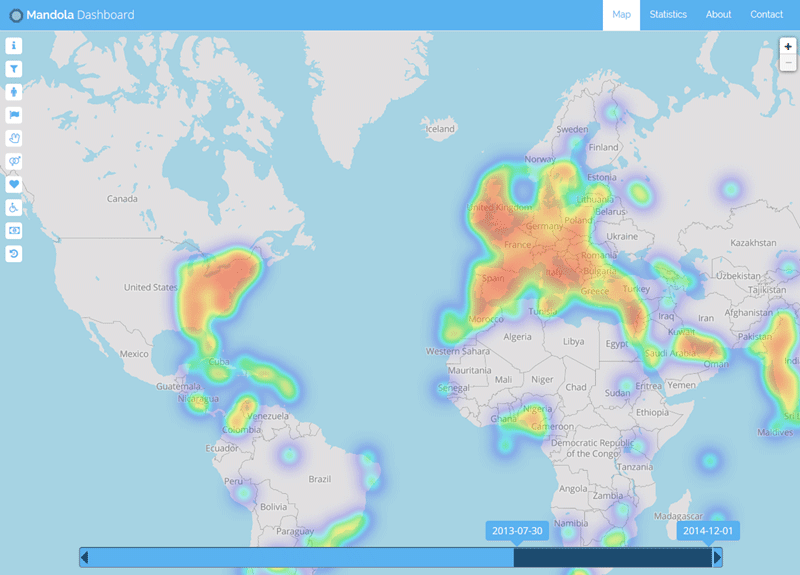by Marios Dikaiakos, George Pallis (University of Cyprus) and Evangelos Markatos (FORTH)
MANDOLA wants to make a bold step towards improving our understanding of the prevalence and spread of online hate speech and towards empowering ordinary citizens and policy makers to monitor and report hate speech.
In recent years an ominous picture about online hate speech has started to materialise within cyberspace. Indeed, recent polls suggest that as many as four out of five respondents have encountered hate speech online and two out of five have personally felt attacked or threatened [L1]. Although it is difficult to get accurate statistics about the spread of hate speech in cyberspace, the picture is becoming increasingly clear: the internet is alarmingly effective at spreading hate speech – so much so that most internet users have encountered it at some point. To make matters worse, hate speech usually targets the most vulnerable groups within society: children, minorities, and immigrants – groups that by definition have little capacity to protect themselves, both in the online and the physical worlds. There are two major difficulties in dealing with online hate speech: (i) Lack of reliable data that can show detailed online hate speech trends. (ii) Poor awareness about how to deal with the issue since there is a fine line between hate speech and freedom of speech: the boundaries between legal and illegal hate speech are sometimes blurred, and may vary between territories.

Figure 1: Mandola Monitoring Dashboard.
MANDOLA [L2] plans to contribute towards filling this gap by: (i) monitoring the spread and penetration of online hate-related speech in Europe and in member states using big data approaches; (ii) providing policy makers with actionable information that can be used to promote policies that mitigate the spread of online hate speech; (iii) providing ordinary citizens with useful tools that can help them deal with online hate speech; (iv) transferring best practices among member states; (v) setting up a reporting infrastructure that will connect concerned citizens with the police and appropriate abuse desks and which will enable the reporting of hate-related speech and dangerous speech.
These goals will be achieved by: (i) developing a multi-lingual monitoring dashboard that will offer reliable information about online hate speech enabling users to focus on their geographic region ranging from their city to their country to the entire European Union. This monitoring dashboard will distinguish, if found feasible, between potentially illegal and potentially legal content. The dashboard will use Twitter and Google as sources of possible hate-related online content. Previous works [1, 2, 3] have demonstrated that Twitter can be used to monitor and detect trends in online hate speech; (ii) developing a smartphone app which will (a) spread awareness to users about online hate speech enabling users to understand and isolate such contents, and which will (b) enable illegal online hate speech to be reported when encountered; (iii) developing a network of National Liaison Officers (NLOs) who will act as the main contact point for their member state; (iv) delivering a Frequently Asked Questions Manual on “Responding to online Hate Speech”; (v) conducting a study of the definition of illegal hatred throughout the European Union, which will enable us to clarify the precise kind of contents to be targeted as well as a study of the legal framework surrounding hate-related speech monitoring and reporting.
The main innovative aspect of MANDOLA is the use of a clear technology-based big data approach to monitoring and reporting online hate speech. This approach is based on the state of the entire visible internet (both Google and Twitter) and can show a clear and representative state of hate speech online. This technology-based approach, which takes care of ethical and legal aspects, gives us a full picture of hate speech on the entire internet allowing us to zoom in to any place and time interval needed for each specific purpose.
The target groups of MANDOLA are:
- Ordinary citizens (i) will have a better understanding of what online hate speech is and how it evolves, (ii) will be able to recognise it when they see it and understand when freedom of speech crosses the boundary into illegal hate speech and (iii) will know how to cope with illegal online hate speech when they encounter it.
- Policy makers will have online hate speech-related information at their fingertips – actionable information that can be used to make decisions.
- Witnesses of online hate speech incidents will have an opportunity to report hate speech anonymously.
MANDOLA is a two year project (started 1st October 2015) and is co-funded by the Rights, Equality and Citizenship (REC) Programme of the European Commission. MANDOLA consortium consists of seven partners from six countries: FORTH (Foundation for Research and Technology – Hellas), Aconite Internet Solutions (Ireland), the International Cyber Investigation Training Academy (Bulgaria), Inthemis (France), the Autonomous University of Madrid (Spain), the University of Cyprus (Cyprus) and the University of Montpellier (France). The project is led by FORTH.
This article was written with the financial support of the Rights Equality and Citizenship (REC) programme of the European Union. The contents of this publication are the sole responsibility of the authors and can in no way be taken to reflect the views of the European Commission.
Links:
[L1] http://eeagrants.org/News/2012/Countering-hate-speech-online
[L2] http://mandola-project.eu/
References:
[1] P. Burnap et al.: “Detecting tension in online communities with computational Twitter analysis”, Technol Forecast Soc Change 95:96-108, 2015.
[2] P. Burnap, M. L. Williams: “Us and Them: Identifying Cyber Hate on Twitter across Multiple Protected Characteristics”, EPJ Data Science, 5:11, 2016, http://link.springer.com/article/10.1140/epjds/s13688-016-0072-6.
[3] L. Silva, et al.: “Analyzing the Targets of Hate in Online Social Media”, in Proc. of the International AAAI Conference on Weblogs and Social (ICWSM’16), Cologne, Germany. 2016.
Please contact:
George Pallis, University of Cyprus
http://www.cs.ucy.ac.cy/~gpallis/











